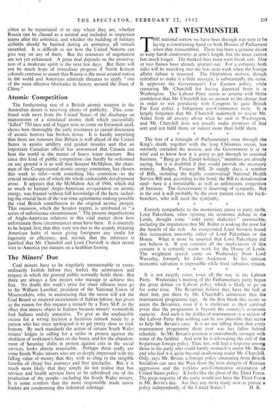AT WESTMINSTER
THE national sorrow we have been through was seen to be laying a constraining hand on both Houses of Parliament when they reassembled. There has been a genuine desire to keep harsh controversy at arm's length, but the truce cannot last much longer. The banked fires must soon break out. One or two flames have already spurted out. For a certainty both sides will be marching into the lists next week when the foreign affairs debate is resumed. The Opposition motion, though redrafted to make it a little stronger, is substantially the same. It approves the Government's Far Eastern policy, while censuring Mr. Churchill for having departed from it in Washington. The Labour Party seems to assume with blithe confidence that Mr. Churchill has no answer to the charge that in order to win popularity with Congress he gave British Far East policy a belligerent anti-Communist twist. It is largely forgotten that Mr. Churchill undertook to rescue Mr. Attlee from all anxiety about what he said in Washington, and Mr. Churchill does not usually make promises of that sort and not fulfil them, or indeed more than fulfil them.
* *
The loss of a fortnight of Parliamentary time through the King's death, together • with the long Christmas recess, has seriously curtailed the session, and the Government is at its wits' end to know how it is going to get through its essential business. " Bang go the Easter holidays," members are already saying, but it is doubtful if that would provide the necessary remedy. Budget, Finance Bill, 26 supply days, a number of Bills, including the highly controversial National Health Service Bill and, according to the bond, the Bill to denationalise steel—here is a formidable, as well as unforeseen, congestion of business. The Government is deserving of sympathy. But in the end it will probably be the poor patient oxen, the back- benchers, who will need the sympathy.
* * * *
Entirely sympathetic to the momentary pause in party strife, Lord Pakenham, when opening the economic debate in the Lords, thought some " mild party dialectics " permissible, including the imputation that Mr. Butler is soaking the poor for the benefit of the rich. An exasperated Lord Swinton found this insinuation unworthy either of Lord Pakenham or the House. What is more he asserted that Lord Pakenham did not believe it. If you consider all the implications of this censure it is certainly warm work for the House of Lords. The weightiest speech came on Wednesday from Lord Waverley, formerly Sir John Anderson. In his opinion economic salvation is impossible while food subsidies remain.
*
It is not exactly roses, roses all the way in the Labour Party. Wednesday's meeting of the Parliamentary party began the great debate on Labour policy which is likely to go on for some time. The Bevanites believe they have the ball at their feet, put there by Mr. Churchill's admission that the rearmament programme lags. At the first blush this seems to assist the Bevanites, even if it is irrelevant to their cardinal point that the programme is beyond the country's economic capacity. And such is the dislike of rearmament in a section of the Labour Party that nothing can be too plausible that seems to help Mr. Bevan's case. It is no use telling them that every rearmament programme there ever was has fallen behind schedule. So Mr. Bevan's position is undoubtedly stronger with some of the faithful. And now he is advocating the end of the bi-partisan foreign policy. That, too, will find a response among those in the party who could hardly stomach it under Mr. Bevin and who feel it is quite beyond swallowing under Mr. Churchill. Only, says Mr. Bevan, a foreign policy emanating from British Socialism can save the West from the twin dangers of Russian aggression and the reckless anti-Communist orientation of United States policy. It looks like the ghost of the Third Force. The great majority of the party would not have the Third Force in Mr. Bevin's day. Are they any more ready now to pursue a policy independently of the United States ? H. B.


































 Previous page
Previous page